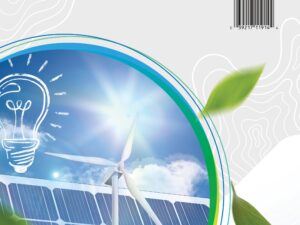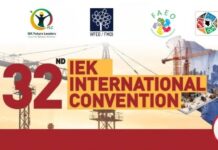Last Updated 3 months ago by Kenya Engineer
In mid-September 2025, engineering professionals, policymakers, educators and innovators from across Africa convened in Kampala, Uganda, for the 11th UNESCO Africa Engineering Week & 9th African Engineering Conference (AEW & AEC). Held from 14-20 September at Speke Resort, Munyonyo, the event was hosted by the Uganda Institution of Professional Engineers (UIPE), in collaboration with UNESCO, the Federation of African Engineering Organizations (FAEO), and a host of regional and international partners.
Theme, Scope, and Rationale
The theme for the week—Engineering Innovations for Sustainable Development in Africa—resonated deeply in a continent facing intersecting challenges: infrastructure deficits, climate change, human capacity shortfalls, and widening demands for resilient systems. Two newly released reports, the Global Engineering Capability Review (GECR 2025) and Engineers in Africa (EFA) 2025, underscored the urgency: in some parts of sub-Saharan Africa, there are fewer than two engineers per 10,000 people, far below the global average of fifty. These shortfalls are no longer theoretical—they impact safety, economic growth, public health, energy access, and more.
Key Events & Side Forums
AEW 2025 was rich in side‐events designed to move beyond ideas to action. Among these:
- Registrar’s Forum: One of the side-events was a Registrars’ Forum, chaired by Eng. Margaret Ogai, Registrar/CEO of the Engineers Board of Kenya (EBK). The Forum brought together engineering registration boards and professional regulators from various African countries to deliberate on harmonizing standards of registration, mobility of engineers across borders, regulatory compliance, and enforcement of ethical practice. It was noted that strengthening regulatory frameworks is essential for raising engineering capacity and ensuring public safety.
- CEO & Ministerial Roundtables: High-level roundtables involving leaders from government, private sector and academia met to align public-private partnership (PPP) frameworks, address infrastructure financing gaps, and explore scalable local innovations. These included discussions on enabling policy, streamlined procurement, and investment in research & development.
- Innovation Exhibition & Innovation Forums: The conference showcased indigenous innovations from across the continent—prototypes, startups, and research breakthroughs—especially in renewable energy, water, agriculture, digital technologies. The Innovation Forums allowed for direct interaction between innovators, investors, and implementers.
- Capacity Building and Education Sessions: Workshops and technical sessions explored how engineering education can be reformed to meet Africa’s unique needs: more practical exposure, alignment with SDGs (clean energy, water, resilient infrastructure), and inclusion of AI and digital skills. There was special attention to training women engineers and creating pathways for young professionals.
Outcomes & Key Takeaways
From the week’s deliberations, a number of concrete outcomes and consensus points emerged:
- Harmonization of Professional Standards
Regulators resolved to push for more uniform registration standards across African countries. The Registrars’ Forum committed to work toward mutual recognition agreements, so that engineers registered in one country can more easily work in others without duplicative credentialing. Ethical codes and continuous professional development (CPD) enforcement were also emphasized. - Policy Recommendations for Infrastructure Financing
There was widespread agreement on the need for innovative financing: blended finance, PPPs, leveraging private sector investment, and devolving financial resources to local governments. Participants urged governments to adopt policies that reduce risk for investors (through guarantees, insurance, and transparent regulation), and to provide incentives—tax breaks, subsidies—for innovations and start-ups. - Focus on Local Innovation & Home-grown Technology
One of the most encouraging trends was the growing portfolio of local, context-relevant engineering solutions—from off-grid energy systems, low-cost water engineering, smart transport, to digital tools for agriculture. Stakeholders called for better funding, incubation support, and platforms to scale these home-grown innovations rather than importing solutions ill-suited to local conditions. - Education & Skills Development Reform
A recurring theme: academic curricula must be retooled to emphasize hands-on learning, field exposure, internships, and industry partnership. Several universities committed to establishing or expanding short courses, master’s programmes, and practical workshops, aligned to national infrastructure and energy sector needs. Special focus was placed on widening access for women and youth in engineering. - Technology for Climate Resilience & Sustainability
Climate change continues to stress Africa’s infrastructure, water systems, and energy grids. AEW 2025 saw strong calls for integrating resilience: engineering solutions that can withstand natural disasters, seasonal variability, and climate shocks. Renewable energy, efficient water management, and smart cities were repeatedly named as priority sectors. - Engineering Mobility & Regional Collaboration
The registrars’ discussions and various sessions highlighted the potential for cross-border collaboration—sharing of expertise, mobility of engineers, joint research, regional standardisation. These were seen as essential for economies of scale and for addressing transnational challenges (e.g. energy grids, water basins, transportation corridors).
Challenges That Remain
While the week was rich in ideas and commitments, participants recognised persistent constraints:
- Funding Gaps: Many local innovations are constrained by limited access to seed capital, venture funding or grants. Scaling from prototype to fully deployed solution remains difficult.
- Regulatory & Bureaucratic Hurdles: Differing policies across countries, slow approval processes, import duties on technology components, and inconsistent regulatory enforcement were flagged as barriers.
- Capacity Bottlenecks: Even where educational reforms are underway, the number of fully qualified engineers remains low in many countries; there is also shortage of mentors, research infrastructure, and technical labs.
- Equity & Inclusion Gaps: Women, rural engineers and marginalized communities are still underrepresented in leadership, innovation, and professional recognition.
- Implementation Gaps: Moving from policy and recommendations to actual project delivery—on time, within budget, with quality standards—is often a major hurdle.
Highlights from Kenya & EBK’s Role
Kenya and the Engineers Board of Kenya (EBK) were active throughout the week:
- Eng. Margaret Ogai, Registrar/CEO of EBK, chaired the Registrars’ Forum and participated in panel discussions. EBK’s involvement emphasized Kenya’s interest in regional harmonization and recognition of engineering credentials.
- Kenyan institutions showcased innovations and participated in education & training sessions. The Kenya engineering sector’s strong presence underlined its growing role in the regional engineering ecosystem.
Moving Forward: What Needs Tracking
For our readers and the industry at large especially in Kenya and the East African region, the following are things to watch:
- Implementation of mutual recognition agreements among engineering boards: how quickly will they be adopted, who signs, and how practice mobility will change.
- The roll-out of curricula reforms in universities and technical colleges: tracking which institutions adapt, what resources are allocated, and trainee outcomes.
- Investment in local innovation: which startups or prototypes from AEW 2025 secure funding, contracts, or expand operations.
- Government policy changes: particularly in procurement, tax incentives, import duties for engineering components, PPP regulation.
- Monitoring of climate‐resilient engineering projects built in the coming years (water systems, renewable energy, transportation infrastructure).
Africa Engineering Week 2025 served as more than a convening—it was a landmark moment of reflection, commitment, and hope. The continent’s engineers, regulators, educators, and innovators clearly showed that while Africa has many challenges, there is no shortage of creativity, drive, and home-grown solutions.
What now counts is converting ideas into action—making the policy changes, investing in capacity, and scaling innovations so that engineers across Africa can build resilient infrastructure, deliver sustainable development, and ensure engineering is not just a profession, but a force for transformation.
























